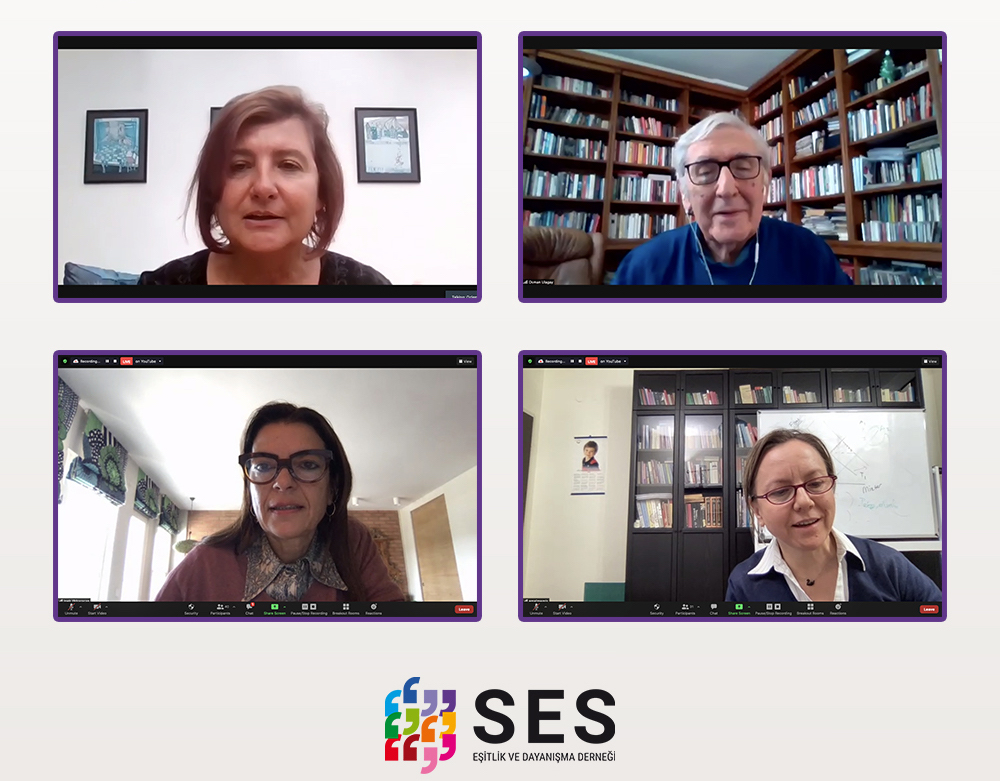An online event organized by the SES Equality and Solidarity Association, titled “A Sustainable System Proposal: An Egalitarian Feminist Economy”, focused on the possibilities of proposing a new economic paradigm that features the feminist agenda.
The online event titled “A Sustainable System Proposal: Egalitarian Feminist Economy”, organized by the SES Equality and Solidarity Association, hosted Prof. Dr. İpek İlkkaracan, economist Professor Dr. Ozlem Onaran, Associate Dr. Emel Memiş and journalist Osman Ulagay to discuss the proposals of a new economic paradigm that incorporates the feminist agenda.
Gülseren Onanç, Founding President of SES Equality and Solidarity Association, who moderated the event, launched the event by underlining that civil society should be directly involved in politics for democracy to exist in Turkey.
Onanç also stated that “Feminist policies need to be implemented in Turkey’s future. We organized this meeting to ensure that our feminist economic proposals are being discussed and adopted to get out of the economic crisis that the world and Turkey are going through after the pandemic.”
The event started with the presentation by Istanbul Technical University faculty member Prof. Dr İpek İlkkaracan who is known for introducing the term “purple economy” to the literature. İlkkaracan evaluated TÜSİAD’s (Turkish Industry and Business Association) new report “Building the Future with a New Understanding: People, Science, Institutions,” and the report written as part of Generation Equality Forum titled “For the People and the Planet: Global Feminist Economic Justice Agenda” which presented a new economic development model.
İlkkaracan put forward these questions in her presentation: “Is economic shrinkage, an economy that observes ecological balance necessary? How can we reach fair downsizing? Can feminist and green growth be an alternative to forced downsizing?”
In light of her questions, she explained the importance of ‘care labor’ and ‘care economy’, which are the key concepts of feminist economics.
She further stated that:
“Feminist economics criticises traditional economics as being based on men’s lives. It highlights the contributions of unpaid care work, demands a redefinition of the economy in this way, and points out that the care economy, which is largely unpaid and the main workforce is women, lies at the root of inequalities.”
“There is a production area where the ecological balances reproduce themselves, and on top of that, the domestic and transgenerational workforce, labor and social infrastructure are reproduced. Both are important production layers. Only after these are well placed on each other and start to function, do they allow the production of markets production and the emergence of the financial sector. The care economy, that is, the purple economy, where feminists work, and the green economy, which environmental economists work on, are the fields of study that try to reveal the visibility of these two sub-fields.
İlkkaracan also stated that direct care labor can create capacity for employment. Moreover, since it is not possible to turn care labor into fully paid labor, market regulations and policy interventions are needed not only for the dissemination of social care services, but also for the equal sharing of domestic care labor, the nature of which is currently shaped by power relations between men and women.
İlkkaracan also underlined that, “Women’s unpaid care work corresponds to 2 billion full-time jobs around the world, and 86 percent of unpaid care work in Turkey belongs to women.” adding that inequalities have increased globally as COVID-19 has increased the demand for domestic production.
Özlem Onaran, an economist from Greenwich University, said in her speech: “It is very important to understand the long-term positive impact and investment character of social infrastructure and how these expenditures will be financed in terms of developing fiscal and industrial policies. Social infrastructure expenditures can be financed both by progressive income and wealth taxes and by public borrowing. Fair and sustainable development requires public investment, fair wages and working conditions, shortening of working time and eliminating gendered wage, employment and care labor gaps.”
In his speech, economist and writer Osman Ulagay underlined that “the pandemic has forced governments to rethink many of their economic moves. It turns out that many things in the world are unsustainable. Unsustainability is now being voiced by the capital circles as well. It turned out that the concept of sustainability should be handled very broadly. Moving to a different world in all areas of life is now inevitable. People started to think about what needs to be done to move to a different paradigm. It is being discussed in the world how this can be done in a democratic order,” he said.
Stating that the colorful economic model also serves democracy, Assoc. Dr. Emel Memiş commented: “Now is the time for the climate and purple economy. We must act for a just and sustainable world. A new social contract is required. Economic proposals that were deemed radical are being voiced by international institutions today.”


